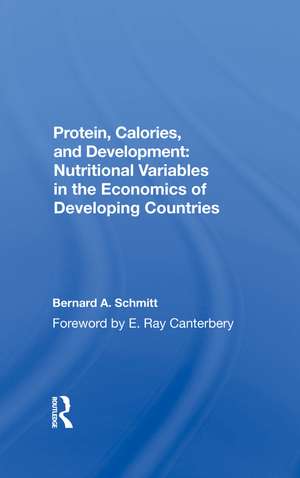Protein, Calories, And Development: Nutritional Variables In The Economics Of Developing Countries
Autor Bernard Schmitten Limba Engleză Hardback – 30 iun 2020
Preț: 739.24 lei
Preț vechi: 991.41 lei
-25% Nou
Puncte Express: 1109
Preț estimativ în valută:
141.46€ • 148.37$ • 117.76£
141.46€ • 148.37$ • 117.76£
Carte tipărită la comandă
Livrare economică 01-15 aprilie
Preluare comenzi: 021 569.72.76
Specificații
ISBN-13: 9780367284541
ISBN-10: 0367284545
Pagini: 246
Dimensiuni: 144 x 229 mm
Greutate: 0.61 kg
Ediția:1
Editura: Taylor & Francis
Colecția Routledge
Locul publicării:Oxford, United Kingdom
ISBN-10: 0367284545
Pagini: 246
Dimensiuni: 144 x 229 mm
Greutate: 0.61 kg
Ediția:1
Editura: Taylor & Francis
Colecția Routledge
Locul publicării:Oxford, United Kingdom
Cuprins
Foreword -- Preface -- The Global Food Problem: Past and Present -- Nutritional Requirements and Diet Quality -- Nutrient Sources and Their Relative Importance -- Production Relationships: Agricultural Commodities in the Developing Countries -- Agricultural Commodity Projections, 1985: An Alternative Approach -- Policy Implications of Nutrition for Developing Countries -- Conclusions -- Major Crops of Each Developing Country -- Calorie Content for Selected Commodities -- Chemical Scores, Limiting Amino Acids, Protein Content, and Conversion Factors for Important Foods -- Population and Food Supply in Individual Countries -- Letter Classifications for Percent Literate Among Adults -- Description of Data a Used in Estimation of Production Functions -- World Population, 1970 and Projections to 1985 and 1990 -- Production of Commodities in Developing Countries, 1970 (Thousand Metric Tons) -- Projected Commodity Balances for 1985: Developing Countries
Notă biografică
Bernard A. Schmitt is an economist with the U.S. Congress Joint Committee on Taxation. He received his Ph.D. from Florida State University and served as a research economist with the Florida State Department of Commerce.
Descriere
Bernard A. Schmitt traces the circular relationship between nutrition and human capital, labor productivity, food production, and per capita consumption of calories and protein. He provides explanations for complex interactions of nutritional variables in the economics of developing countries.
